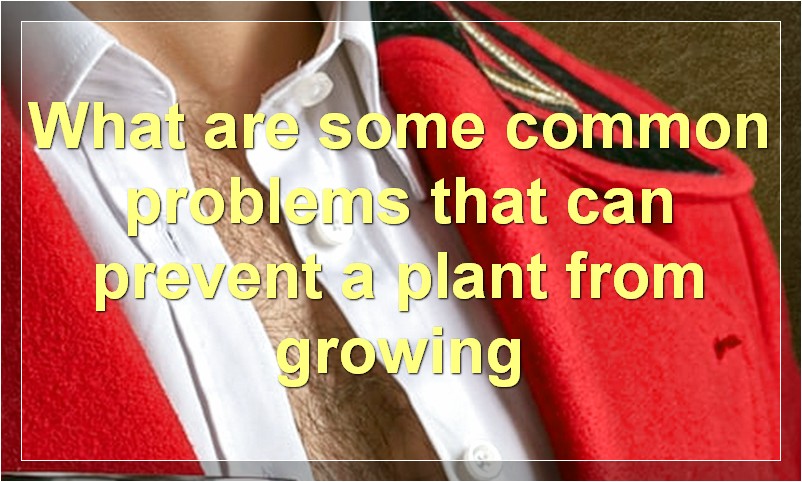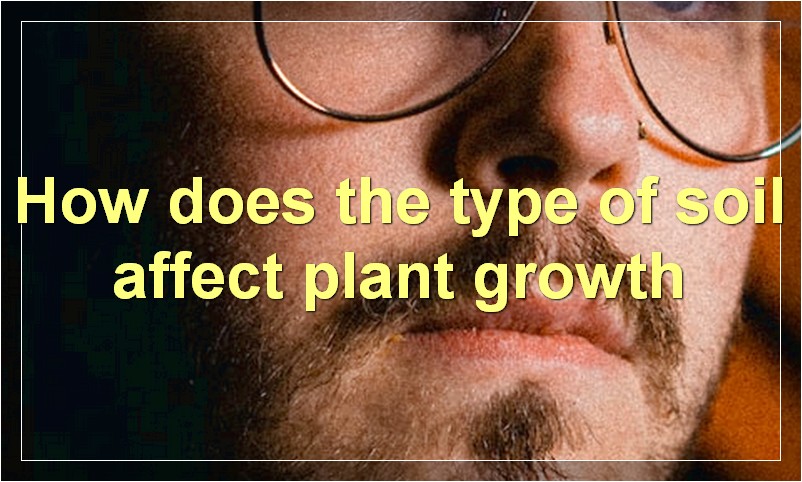If you want your plants to grow, you need to give them the proper care. Here are some tips on how to help your plants grow.
What are some things you can do to help a plant grow
If you want your plants to grow and flourish, there are a few things you can do to help them along. Here are some tips:
1. Give them plenty of light. Plants need sunlight to photosynthesize and produce food for themselves. If they’re not getting enough light, they won’t be able to grow properly.
2. Water them regularly. Plants need water to stay hydrated and to absorb nutrients from the soil. Be sure to water them deeply so that the roots can get access to the water.
3. Feed them. Plants need nutrients to grow, so be sure to fertilize them on a regular basis. You can use organic matter such as compost or manure, or you can use chemical fertilizers. Just be sure not to overdo it, as too much fertilizer can actually harm plants.
4. Prune them. Pruning helps encourage new growth and keeps plants looking tidy. It also helps remove dead or diseased leaves and branches, which can prevent the spread of disease to healthy parts of the plant.
5. Monitor for pests and diseases. Keep an eye out for pests or diseases that might be affecting your plants. If you see anything suspicious, take action immediately to treat the problem before it gets out of hand.
What are some common problems that can prevent a plant from growing
If you’re having trouble getting your plants to grow, you’re not alone. There are a number of common problems that can prevent plants from growing properly. Here are some of the most common problems and what you can do to fix them:
1. Poor Soil Quality
One of the most common problems that prevents plants from growing is poor soil quality. If your soil is too sandy or too clay-like, it can prevent your plants from getting the nutrients they need to grow. To fix this problem, you’ll need to add organic matter to your soil to improve its quality. This can be done by adding compost, manure, or other organic materials to your soil.
2. Lack of Sunlight
Another common problem that can prevent plant growth is a lack of sunlight. Most plants need at least six hours of direct sunlight each day in order to grow properly. If your plants are not getting enough sunlight, they will likely become stunted and may even die. To fix this problem, you’ll need to move your plants to a location that receives more sunlight. If you can’t do this, you may need to supplement your plants with artificial lighting.
3. Too Much Water
While plants need water to grow, too much water can actually be detrimental to their growth. Overwatering can cause the roots of your plants to rot, which will prevent them from being able to take up nutrients from the soil. To fix this problem, you’ll need to water your plants less frequently or make sure that the soil drains well so that excess water can escape.
4. Pests and Diseases
Pests and diseases are another common problem that can prevent plant growth. Insects such as aphids and whiteflies can damage plant leaves and stunt growth. Meanwhile, diseases such as powdery mildew and root rot can kill plants outright. To control pests and diseases, you’ll need to use pesticides and fungicides according to label directions. You may also need to remove infected plants from your garden to prevent the spread of disease.
5. Temperature extremes
Finally, temperature extremes can also prevent plant growth. Both hot and cold temperatures can damage plant leaves and inhibit growth. In extreme cases, temperature extremes can even kill plants outright. To protect your plants from temperature extremes, you’ll need to provide them with shelter from the sun or wind in hot weather and from frost in cold weather.
What are the ideal conditions for plant growth
There are a number of factors that contribute to optimal plant growth. These include sunlight, water, temperature, humidity, and soil composition. Let’s take a closer look at each of these factors.
Sunlight is essential for plant growth as it provides the energy needed for photosynthesis. Plants need at least six hours of sunlight per day in order to thrive.
Water is another important factor for plant growth. Plants need water for photosynthesis and to transport nutrients throughout their tissues. The ideal amount of water for plants will vary depending on the type of plant and the climate in which it is growing. In general, however, most plants need to be watered every few days to prevent them from becoming stressed.
Temperature is another important factor to consider when growing plants. Most plants prefer a daytime temperature between 60-80 degrees Fahrenheit and a nighttime temperature between 50-70 degrees Fahrenheit. However, there are some plants that require higher or lower temperatures in order to grow properly.
Humidity is also an important factor for plant growth. Plants need humidity in order to absorb water through their leaves. The ideal humidity level for most plants is between 40-60%.
Soil composition is also a key factor in plant growth. Plants need soil that is rich in nutrients and able to hold moisture well. sandy soils are not ideal for plant growth as they do not hold nutrients well and can quickly become waterlogged. Clay soils are also not ideal as they can compact and become waterlogged easily. Loamy soils are the best type of soil for plant growth as they are able to hold nutrients and moisture well.
How do plants grow in different climates
Different plants have different climatic requirements. In warm climates, many plants will grow well with little or no irrigation during the growing season. They may need supplemental irrigation during extended periods of drought. Plants from cool or cold climates often require more frequent irrigation during the growing season. They may also require irrigation during the winter months to prevent damage from freezing temperatures.
Different plant species have different preferences for soil type, too. Some plants prefer sandy soils while others prefer clay soils. Still others do best in loamy soils, which are a mix of sand, silt and clay. The ideal soil for most plants is loose and friable, allowing roots to penetrate easily in search of water and nutrients.
Most plants also prefer a sunny location. However, some plants will tolerate partial shade, and a few species even prefer shady locations. When choosing a location for your plants, it is important to consider their light requirements.
Temperature is another important factor to consider when growing plants. Most plants prefer moderate temperatures and will not tolerate extreme heat or cold. If you live in an area with extreme temperatures, you will need to choose plants that are tolerant of the conditions in your area.
Plants also differ in their water needs. Some plants, such as cacti and succulents, are very drought tolerant and can survive on very little water. Other plants, such as ferns and impatiens, require moist conditions and regular watering to stay healthy. When choosing plants for your garden, it is important to consider their water needs so that you can provide them with the proper care.
How does the amount of light affect plant growth
How Does the Amount of Light Affect Plant Growth?
It is a well-known fact that plants need light to grow. But how does the amount of light affect plant growth?
If a plant does not receive enough light, it will become etiolated, or stretchy. This is because the plant is trying to reach for the light. The plant will also have fewer leaves and their leaves will be smaller than normal.
If a plant receives too much light, it will sunburn. The leaves will turn red or brown and they may even fall off. The plant will also stop growing.
So, how much light do plants need to grow properly? It depends on the type of plant. Some plants need more light than others. For example, succulents and cacti need a lot of light to grow well, while ferns and mosses prefer low-light conditions.
In general, most plants need about six hours of direct sunlight per day to grow properly. However, this can vary depending on the type of plant and the time of year. In the winter, when there is less sunlight, plants may need less light.
If you are unsure how much light your plants need, it is best to ask a professional or do some research online. Once you know how much light your plants need, you can make sure they get the right amount by placing them in a sunny spot or using grow lights.
How does the type of soil affect plant growth
Different types of plants have different preferences for the type of soil in which they grow best. Some plants, such as many succulents, prefer dryer soil, while others, such as ferns, prefer soil that is more moisture-retentive. The type of soil can also affect the rate at which a plant grows. For example, sandier soils tend to drain more quickly than denser soils, which can lead to faster growth in plants that prefer well-drained soils.
The type of soil also affects the nutrient availability to plants. Soils can be naturally rich in nutrients, or they can be depleted of nutrients due to past use. Plants that prefer nutrient-rich soils will often grow more quickly and vigorously than those that prefer nutrient-poor soils.
Finally, the type of soil can also affect the pH of the soil, which can in turn affect plant growth. Most plants prefer a slightly acidic soil with a pH between 6 and 7. However, some plants, such as blueberries, prefer a more acidic soil with a pH below 6.
How does watering affect plant growth
Plants are living organisms that require water to survive. Just like humans and animals, plants need water to stay hydrated and to grow. Without water, plants would wilt, dry out, and eventually die.
Water is essential for plant growth because it helps transport nutrients and minerals from the soil to the plant’s roots. Water also helps to keep the leaves of the plant moist, which is important for photosynthesis. Photosynthesis is the process that plants use to create their own food.
So, how does watering affect plant growth?
Well, if a plant doesn’t have enough water, it will not be able to get the nutrients and minerals it needs from the soil. This can stunt the plant’s growth or even kill it.
On the other hand, if a plant gets too much water, the roots can become waterlogged and suffocate. This can also lead to stunted growth or death.
The key to watering plants is to give them just enough so that they can stay healthy and continue growing. Over-watering or under-watering can both be detrimental to plant growth.
How do fertilizers and other chemicals affect plant growth
Fertilizers are essentially chemical compounds that are added to soils to increase their nutrient content. These nutrients, in turn, help to boost plant growth. While there are many different types of fertilizer available on the market, they all work to achieve the same goal – namely, to improve plant growth.
However, it’s important to note that not all fertilizers are created equal. Some fertilizers are more effective than others, and some can even be harmful to plants if used improperly. It’s important to do your research and choose a fertilizer that is well-suited for your particular plants and growing conditions.
In general, though, most fertilizers will promote healthy plant growth when used correctly. Nitrogen, phosphorus, and potassium are the three primary nutrients that fertilizers provide, and these nutrients are essential for healthy plant growth. Nitrogen helps plants to produce chlorophyll, which is responsible for photosynthesis. Phosphorus helps plants to produce strong roots and flowers, while potassium aids in overall plant health and disease resistance.
While all of these nutrients are important, nitrogen is generally considered to be the most important nutrient for plants. This is because nitrogen is required in large quantities by plants and is often the limiting factor in plant growth. As such, adding nitrogen to soil via fertilizer can have a dramatic impact on plant growth.
Of course, it’s important to use fertilizer properly in order to avoid harming your plants. Over-fertilizing can lead to “burned” leaves and stunted growth, so it’s important to follow the directions on your fertilizer packaging carefully. In general, less is more when it comes to fertilizer – it’s better to err on the side of caution than to overdo it.
If you’re looking to improve your plants’ growth, adding fertilizer is a good place to start. Just be sure to do your research and use fertilizer properly in order to avoid harming your plants.
How does pruning and other forms of plant care affect growth
Pruning and other forms of plant care can have a significant impact on the growth of a plant. Pruning can stimulate new growth, increase the size and yield of fruit, and improve the overall health of a plant. Proper pruning can also help to control the shape of a plant, and to keep it from becoming too large or unruly.
Other forms of plant care, such as fertilizing and watering, can also impact the growth of a plant. By providing the right amounts of water and nutrients, you can encourage healthy growth in your plants. Conversely, if you neglect to care for your plants, they may become sick or stunted in their growth.
Thus, it is clear that proper plant care can have a big impact on the health and growth of your plants. By taking good care of your plants, you can ensure that they stay healthy and continue to grow vigorously.
How do different species of plants grow differently
Different species of plants have different requirements for growth. Some need more light, some need more water, and some need more nutrients. The best way to learn how to grow a specific plant is to read the label or ask a nursery worker.
Light
All plants need sunlight to grow, but some need more than others. Plants that need full sun should be placed in an area that gets six or more hours of direct sunlight per day. Plants that need partial sun should be placed in an area that gets three to six hours of direct sunlight per day. Plants that need shade should be placed in an area that gets less than three hours of direct sunlight per day.
Water
All plants need water to grow, but some need more than others. Plants that need lots of water should be watered every day. Plants that need medium amounts of water should be watered every three days. Plants that need little water should be watered every five days.
Nutrients
All plants need nutrients to grow, but some need more than others. Plants that need lots of nutrients should be fertilized every week. Plants that need medium amounts of nutrients should be fertilized every two weeks. Plants that need little nutrients should be fertilized every month.
Table of Contents






